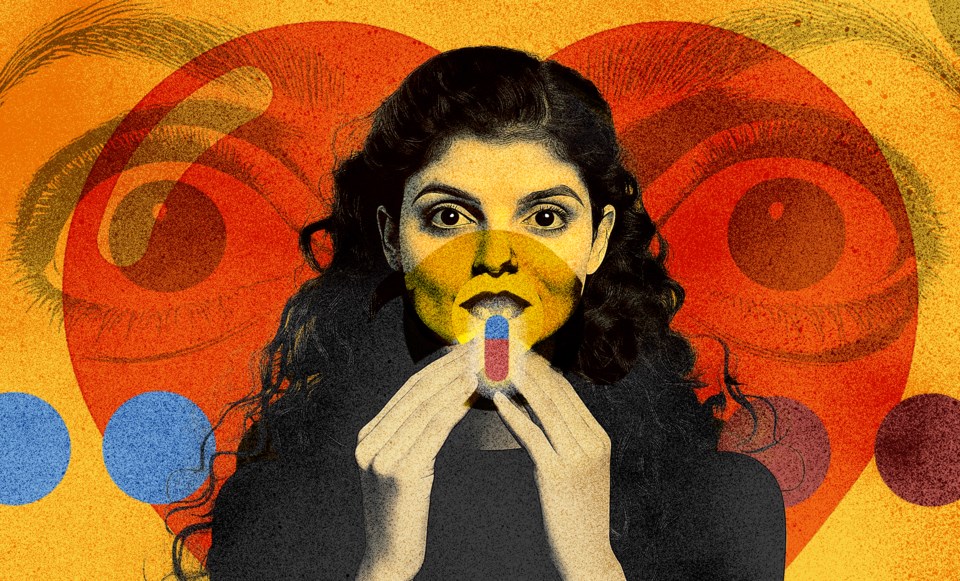It's 6 a.m. when my alarm clock’s screaming beep reaches my eardrum. I traipse downstairs to make a tea, sitting down at the kitchen table as the kettle boils. Staring out the kitchen window into a dark November sky, the quiet beauty of a silent morning is pierced by incessantly bubbling thoughts. Work deadlines. Housing needs. Family to call back. Unreplied texts and emails. No food prepped for the day.
The kettle heats to 100 C and shuts off. I stand up and suddenly feel weak, shaky, dizzy and cold. Breath quickening, I sit down and try to self-regulate by practicing breathwork. It’s a tool I know intimately, having lived with social and generalized anxiety for at least 10 years. Still unwell, I nix the tea and decide to lie in bed. Two steps, I turn the kitchen light off. As my hand falls to my side, my body collapses to the ground.
I come to and wonder why I’m lying on the floor with an ass that hurts. Befuddled and terrified, my roommate, who could help, is still fast asleep. I stagger down the hallway, worm my way upstairs and make it to my bed.
A day later, doctors at the Whistler Health Care Centre ran a series of tests ruling out heart-related problems before telling me I likely experienced vasovagal syncope, otherwise known as fainting, which they believe is linked to my anxiety.
The news confirmed what I’d already Googled, but I felt shame instead of relief. I’d grown to accept fearing conversations with friends or strangers, the constant background noise of anxious thoughts, rare panic attacks and sweating. These seemed like reasonable ways to live for many a year. But to entirely shut down and keel over? Turns out, I found my limit.
The doctors suggested I set up an appointment to discuss my anxiety with a general practitioner at the walk-in clinic, as I didn’t have a family doctor. That doctor said two sentences which changed my life.
“You’ve had anxiety for a decade.”
Something about hearing that timescale from a physician hit home. Then came, “Have you considered medication?”
In all honesty, I had not. Despite having a diagnosis, I approached the symptoms with a slate of other tools. I went to therapy regularly, took up running, practiced yoga, eliminated alcohol for a long stretch of time and journalled. I did everything I could to improve my anxiety, except for one.
At some point in my life, I assumed I was somehow "successful" in managing my anxiety without pharmaceutical treatment. I had an internalized belief that medication meant I was a failure. Letting go of that warped belief was far from easy, with many tears shed. I started speaking with people close to me to reframe my thinking, and in a moment of health-care serendipity, a nurse practitioner (NP) was available in Squamish to take me as a patient. I suddenly had access to primary care.
My NP and I chatted about my symptoms, and they provided a list of potential selective serotonin reuptake inhibitors (SSRIs). I researched on Reddit for other people’s experiences, focusing on side effects and benefits for women who used SSRIs.
More than two months after my fainting spell, I started taking sertraline. The results have been life-changing. I somehow lucked out and found medication on my first attempt that has vastly improved my quality of life. To be clear, this is not what happens for most people. Usually, it takes multiple kicks at the can to find what works for you.
My anxiety hasn’t disappeared entirely. I still have some generalized anxiety, but in social situations, I’m not terrified of what someone else is thinking of me. I can tune into their experience and not just my own. I feel more confident and content.
According to the Canadian Mental Health Association of B.C., anxiety disorders affect 12 per cent of the population in B.C., and it is the most commonly diagnosed mental disorder. I write this column not out of a desire for sympathy but in the hope that it could help someone else. I wonder what my life could have been like if I’d started on medication earlier. While I’d never tell anyone they should take medication, as it’s a decision between them and their doctor, I firmly believe it’s becoming an essential tool in my mental-health toolbox.






